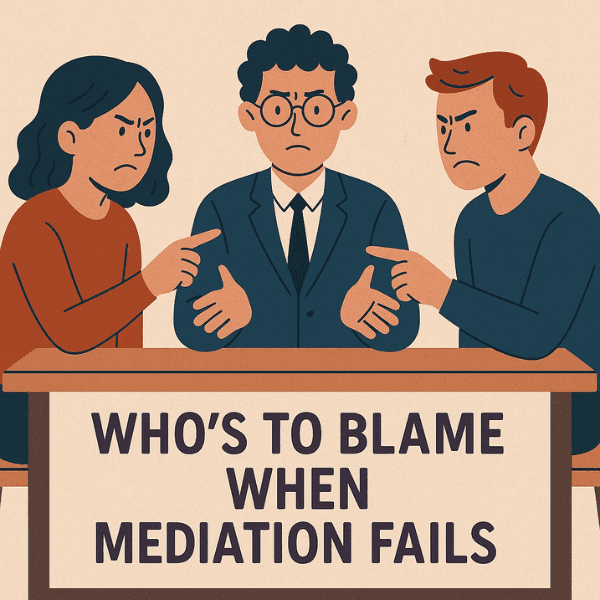Mediation is often seen as a peaceful alternative to litigation—a chance for parties to resolve disputes through dialogue, mutual understanding, and compromise. It’s designed to be collaborative, not adversarial. But what happens when mediation doesn’t work? When parties leave the table frustrated, resentful, and without a resolution?
The instinct may be to ask: Who’s to blame? The answer, like the process itself, is rarely simple.

Why Mediation Fails
Before pointing fingers, it’s important to understand the dynamics that can cause mediation to break down. Most failed mediations share a few common characteristics:
- Lack of genuine participation – If one or both parties aren’t truly willing to engage, the process stalls.
- Power imbalances – When one side dominates, or feels dominated, trust is eroded.
- Unrealistic expectations – Entering with rigid demands or expecting quick, full resolution can lead to disappointment.
- Ineffective mediation – Sometimes the facilitator doesn’t manage the process well, losing control of the room or missing opportunities to redirect conflict constructively.
- Bad timing – Mediation introduced too early (before emotions settle) or too late (when positions are entrenched) can reduce the chances of success.
The Responsibility of the Parties
Mediation is voluntary in spirit—even when legally required. Its success hinges on the mindset and intentions of those involved. If parties are simply “going through the motions,” trying to outmaneuver each other, or showing up with no willingness to compromise, the process is almost certain to fail.
That doesn’t necessarily make them malicious. People bring fear, pain, pride, and history into the room. But for mediation to work, all parties must do more than show up—they have to show up ready to listen, speak honestly, and move toward something different than the status quo.
The Mediator’s Role
A skilled mediator does more than manage a discussion. They read the room, navigate emotional undercurrents, and create space for constructive dialogue. When mediation fails, it's fair to ask whether the facilitator:
- Maintained neutrality
- Created a safe and balanced space
- Managed the process strategically
- Understood the emotional tone as much as the facts
That said, mediators are not magicians. They can't force agreement. But a poorly guided process can certainly contribute to failure.
Systemic and Structural Factors
Sometimes, mediation is set up to fail. For instance, in legal or organizational settings where mediation is mandatory, parties may feel coerced. They may see the process as a formality rather than an opportunity. In those cases, blame might lie less with individuals and more with the structure or timing of the intervention.
Likewise, systemic issues—such as cultural misunderstandings, lack of interpreter services, or legal inequities—can undermine even the best intentions.
So Who Is to Blame?
It’s tempting to look for a clear culprit. But the truth is, when mediation fails, blame is usually shared. One party may have come unprepared. Another may have been unwilling. The mediator may have missed a turning point. Or the process may have been undermined by forces outside the room.
A more constructive question might be: What can we learn from a failed mediation? Every breakdown reveals something—about the people, the problem, and the process itself.
Conclusion
Mediation is never guaranteed to work. But failure doesn’t mean the process was worthless. In fact, failed mediations often pave the way for future resolution—especially when the parties take the time to reflect.
Blame isn’t the end of the story. It’s the beginning of a better one—if we’re willing to learn from it.






